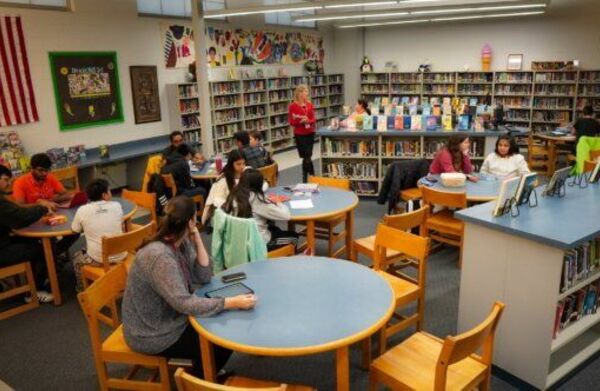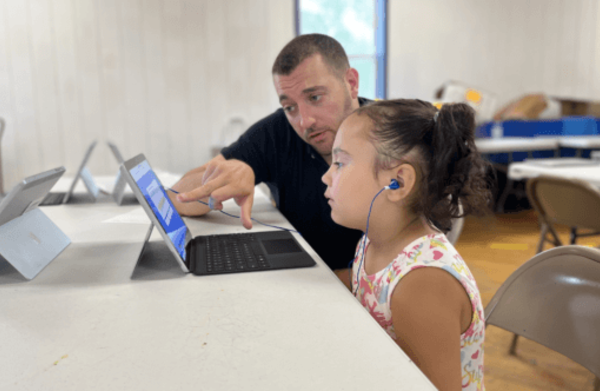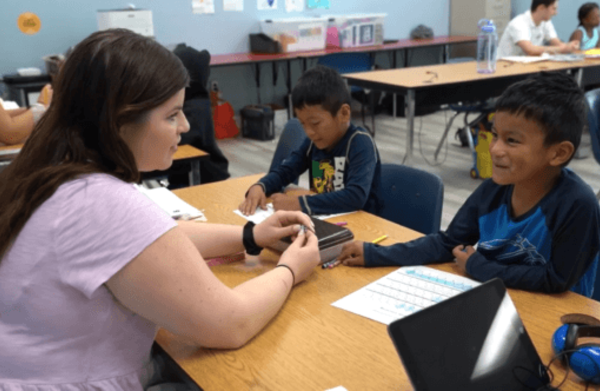Posted on
Fueling the fire of teaching desire: How tutoring is helping one future teacher
Categories: Policy and Advocacy, Pathways into Teaching
In early February, three second grade students clustered around a kidney-bean-shaped table in the back of a colorful classroom in Sycamore Elementary School in Putnam County, Tennessee.
Each had different feelings about reading. One loved it, one hated it, and one was indifferent. But they shared a commonality: each was on the cusp of reading on grade level.
That’s why they were at the table: to get a little extra help from someone who’d been specially equipped to provide it. Megan Jennings, a sophomore teacher-candidate from neighboring Tennessee Technological University, guided the little group through a phonics game.

Jennings held up flashcards and students practiced sounding out words. Every now and then, there were some nonsense words mixed in. One such card read “m-o-m-e.”
“Mohm,” one little boy correctly pronounced, waggling two fingers as he read the card. Jennings noticed his finger shake, recognizing it as the physical reminder of one of the phonics rules they’d learned. She prompted him to articulate this:
“Great job! How did you know this word was pronounced as mohm, not mom?”
“I knew because that’s a magic e at the end, and it makes the o say its name,” he explained.
Jennings lit up with pride at this small victory. Reflecting back later, she explained, “That’s one of my favorite things about teaching and being a tutor — I love to see when the lightbulb goes off in their brain, and they figure something out. It’s special.”
Building a local tutoring partnership
Jennings missed those special moments during the last few years. This semester is her first time back in an elementary classroom since the pandemic began. Before everything shut down, she volunteered with younger students as part of her high school’s Teaching as a Profession program.
“It was an incredible program that really lit a flame, a desire in my heart to continue pursuing education,” she said. “I believe I have a passion and a talent for teaching, that it’s a gift I’ve been given. I really want to use that gift to help change the world.”
Faculty in the educator-preparation program at Tennessee Tech recognized that passion, and invited her to participate in a new tutoring partnership with Putnam County School System.
She feels lucky to access such valuable field experience as a sophomore — years before she’ll join a classroom as a student teacher, and before she even begins higher-division education courses.
“Tutoring is a tremendous opportunity for students who want to become teachers, because it gives them a real sense of a day in the life of a teacher,” said Dr. Lisa Zagumny, Dean of the College of Education at Tennessee Tech. “It gives them an opportunity to see what teaching will be like before they even have to pursue it as a major. It lets them get comfortable in the classroom.”
The tutoring program was designed from the ground up this year when the district received federal funding from ESSER grants, which are intended to help communities design local responses to the learning disruption caused by the COVID-19 pandemic. The district accessed the funding through the state’s new initiative to incentivize such tutoring partnerships, the TN ALL Corps.
To ensure teacher-candidates were well-equipped to work as tutors, the district offered comprehensive training to them, including a full-day workshop on Tennessee’s new phonics program, Reading 360, which is being implemented in schools statewide. Instructional coaches from the district are also coaching the candidates throughout the process, grounding their support in the science of reading.
Jennings found the training to be practical and useful, and she enjoyed getting a preview of how she’ll be expected to use phonics in her own classroom later on.
Through tutoring, she hopes to instill a love of reading in the children she’s working with, and learn practical strategies to do so. Being in the classroom and working with students is invaluable, she said, as it gives her an opportunity to try out the ideas she’s learned about in training and in her education classes.
And in the face of mounting teacher burnout and low morale, Jennings believes that this type of tutoring partnership could spark greater interest in the teaching profession.
“It sounds silly because what is one program going to do, but if you were to implement it everywhere, then it could change the perspective on teaching,” she said.
To learn more about how local school districts are partnering with educator-preparation programs to activate aspiring teachers as tutors — and Deans for Impact’s plans to support them — download our guide, Strengthening Pipelines and Supporting Students, or contact Senior Policy Director Patrick Steck (psteck@deansforimpact.org).
Related Stories:

Blog
From tutor to teacher: how Illinois’s state tutoring program is building local pathways into teaching
In a brightly-lit corner of the library at Rochelle Middle School, aspiring math teacher Angie...
March 09, 2023

Blog
Learning to use formative assessment in one New Jersey tutoring program
During a recent visit to the New Jersey Tutoring Corps (NJTC), I watched Kathy Ricci...
January 25, 2023






